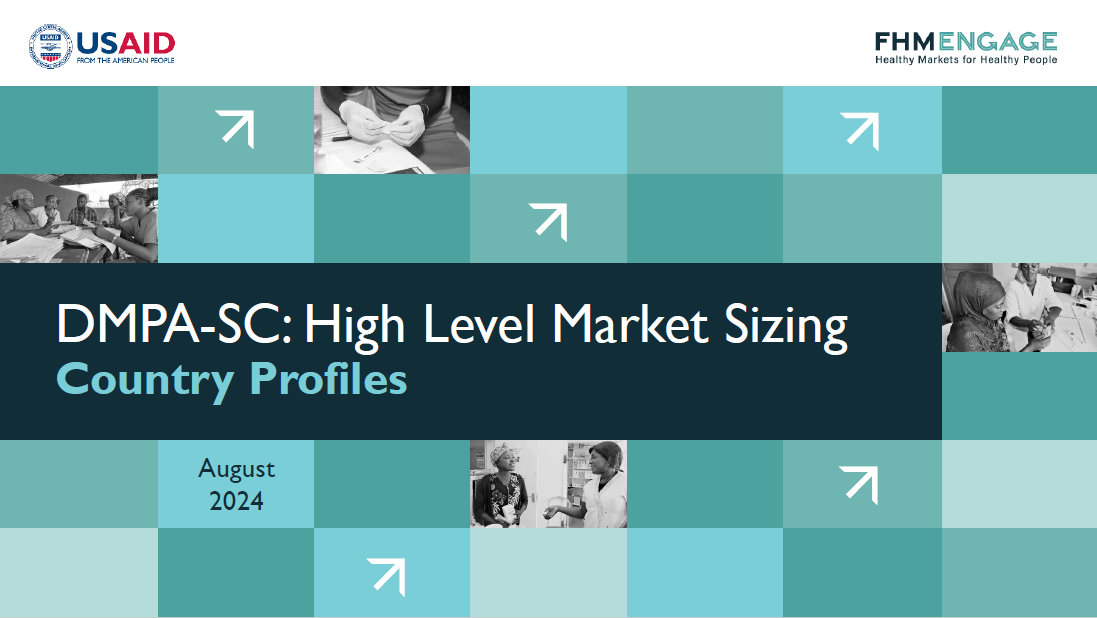
Healthy Markets CoP Session - Pharmacies and Drug Shops - December 2024
The December HMCoP session explored the critical role of pharmacies and drug shops as private sector sources of FP/SRH products and services. This session showcased expert insights and sparked discussions on innovative approaches to strengthen the sector’s contributions to health systems, align with policy frameworks, and meet community needs.
Watch the session
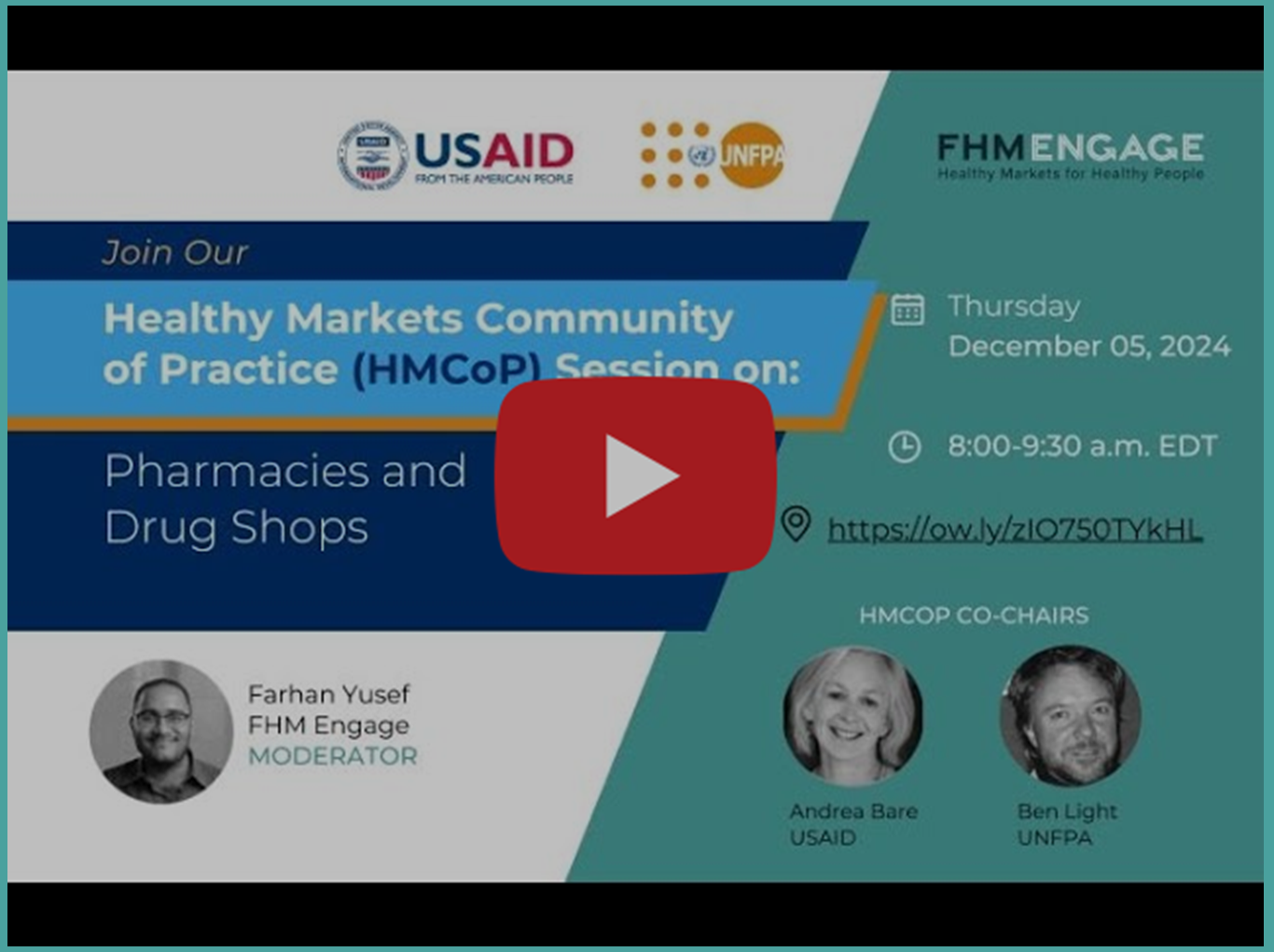
Speaker highlights
 | Dr. Vinit provided an overview of High Impact Practices (HIPs) for family planning, emphasizing pharmacies’ role in expanding access to FP/SRH services. His presentation outlined promising evidence for policy interventions and highlighted gaps that require further exploration. | |
| Michael Alagbile from SFH Nigeria shared the successes and challenges of the IntergratE Project, which integrates community pharmacists and medicine vendors into FP service delivery. Key achievements included policy changes enabling these professionals to provide injectables and implants. |
| |
 | Mercy Chamwalira, CEO and founder of Mitch Investments, Malawi presented the unique challenges faced by private pharmacies, including product shortages and competition from free public services. Mercy proposed innovative solutions such as training more staff and adopting business models that attract private sector investment. | |
| Elsa Nhantumbo from the MOMENTUM Private Healthcare Delivery (MPHD) project in Mozambique showcased how MPHD integrates pharmacies into district-level data systems and fostering stronger public-private partnerships. Elsa emphasized the importance of ensuring pharmacies have a voice in policy discussions and implementation. |  | |
| Wanjiru Munene from InSupply Kenya highlighted the success of supply chain optimization initiatives and collaborative efforts with professional associations to strengthen pharmacies’ role in FP markets. | |
Key takeaways
The Role of Pharmacies and Drug Shops in FP/SRH Markets
- Pharmacies and drug shops serve as critical access points, particularly for underserved and remote communities, offering convenience, privacy, and cost-effectiveness.
- In many LMICs, policies and regulatory frameworks often hinder pharmacies and drug shops from realizing their full potential to provide key FP/SRH products and services to their communities.
Challenges Addressed
- Outdated regulatory frameworks and restrictive policies. These include policies hindering pharmacies and drug shops from stocking, dispensing, and marketing some FP/SRH products.
- High turnover among pharmacy staff and limited training opportunities, especially for training provided by the public sector. Financial barriers, including access credit and sustainable business models.
- Supply chain constraints affecting product availability and affordability.
Strategic Solutions Proposed
- Advocacy for tiered accreditation models and more supportive operating environments.
- Strengthened and regular training programs for pharmacy staff to enhance service quality.
- Pharmacies and drug shops to be represented in key platforms related to FP/SRH products and services and to be updated with any relevant policy and regulatory changes.
- Partnerships between private and public sectors to ensure product supply and demand creation.
- Leveraging of data systems to integrate private sector contributions into national health strategies.
- Strengthened pharmacy and drug shops networks and associations that can play various roles in enhancing their roles in FP/SRH markets.
Highlights from session chat
- Multi-Month Dispensing Policies- The group discussed the challenges and opportunities surrounding multi-month dispensing for pharmacies, with examples from different contexts like Nigeria. Policies on dispensing and their impact on pharmacy-based care were highlighted.
- DMPA-SC Availability and Training- Participants explored the availability of DMPA-SC for self-injection in pharmacies and the importance of training licensed pharmacists to administer injectables. Training gaps and staff preparedness were identified as critical areas for improvement.
- Data Availability Challenges- Data shortages and the need for streamlined processes to share information with government stakeholders were emphasized as barriers to efficient service delivery.
- Tiered Systems for PPMVs- The tiered system for Patent and Proprietary Medicine Vendors (PPMVs) in Nigeria sparked a debate on whether it unleashes market potential or adds complexity.
- Demand Creation Through Behavioral Change Training- The group stressed the need for behavioral change training for community pharmacies and drug shops, particularly in Sierra Leone, to enhance uptake of family planning commodities.
Resources
- High Impact Practices (HIP) Resources- Stay informed with updated guidance and evidence-based practices supporting pharmacy and drug shop interventions in FP/SRH.
- Global Health Supply Chain Project Paper- understand how supply chain innovations are reshaping pharmacy and drug shop contributions to FP/SRH services.
If you have resources or an upcoming event that you would like featured in the HMCoP newsletter or HMCoP website that would be of interest to HMCoP members, please contact FHM-HMCoP@fhm-engage.org.
Next meeting
Join the next HMCoP session on Thursday January 30,2025 which will focus on Markets for Youth in the family planning (FP) and sexual and reproductive health (SRH) sectors. Featuring speakers from diverse country contexts, the session will create space for meaningful discussions on the opportunities to increase youth access to FP/SRH products and services.
Zoom Link to join session: https://ow.ly/20H950UrUJX
Banner photo: Issoufou, a pharmacist in Niger's Dosso region. Photo Credit: Juyoung Lee, UNOPS
Recent Highlights
-
Written by : FHM Engage
-
Published on : 24-Jan-25
- Highlight Type :
- Country :
- Project : FHM Engage
- Language : English

FHM Engage Showcases Market Development Approach at Global Health Systems Research Symposium, Nagasaki, November 2024
FHM Engage Showcases Applicaiton of Market Development Approach at Global Health Systems Research Symposium, Nagasaki, November 2024
FHM Engage Technical Advisor Amanda Kalamar presented a poster at the Global Symposium for Health Market Research in Nagasaki, Japan this week on Using a Market Development Approach for Family Planning.
Background: A market development approach analyzes a market, such as for family planning services and commodities, to identify market constraints that inhibit barriers to sustainable use. As a first step, it begins with an analytical approach to understanding current market performance in terms of users as well as other actors in the market that play different supporting functions (e.g., stewardship, access to financing, and the rules, regulations, and norms that govern the market).
Methods: Using data from multiple sources, including Demographic and Health Survey data, sales and distributions data, and key informant interviews, the resulting market description puts the user at the center to diagnose who the market is failing and how the market is failing to address user needs, and identifies the underlying root causes of those failures to inform the design of solutions and the current market’s capacity to address the issue. Frontier Health Markets Engage, a USAID-funded project, applied this market development approach to engage the private sector in India.
Results: The market description analyses revealed several key constraints, including low contraceptive knowledge among adolescents and low use of contraception in early years of marriage, inequities in contraceptive use primarily attributed to user patterns of services in the private sector, and recent amendments to new drug approval processes that have made it more stringent and potentially slower. There is also a lack of incentives for the private sector in India to invest in innovation and range. To address these constraints and catalyze the private sector to serve youth, FHM Engage in India is using an integrated marketplace approach that will provide access to health information, help to steward the private sector market to increase access to quality FP/SRH products and services, and enhance access to credit for private sector market actors to improve product affordability.
Discussion/conclusions: This application highlights how a market development approach for family planning can reveal key insights to inform the design of solutions intended for impact and sustainability. There are three key takeaways and lessons learned for future applications: 1. An adaptable approach with basic standard tools is essential for diagnosis and a shared understanding of who the market will serve; 2. Analysis by experts and involvement of market actors for discussion, interpretation, and implications are critical to agree on key market constraints to address; and 3. Initial partnerships with commitments from market actors across core supply, demand and supporting functions are important for solution design.
To view the poster, click here.

Recent Highlights
-
Written by : FHM Engage
-
Published on : 20-Nov-24
- Highlight Type : Event
- Country :
- Project : FHM Engage
- Language : English
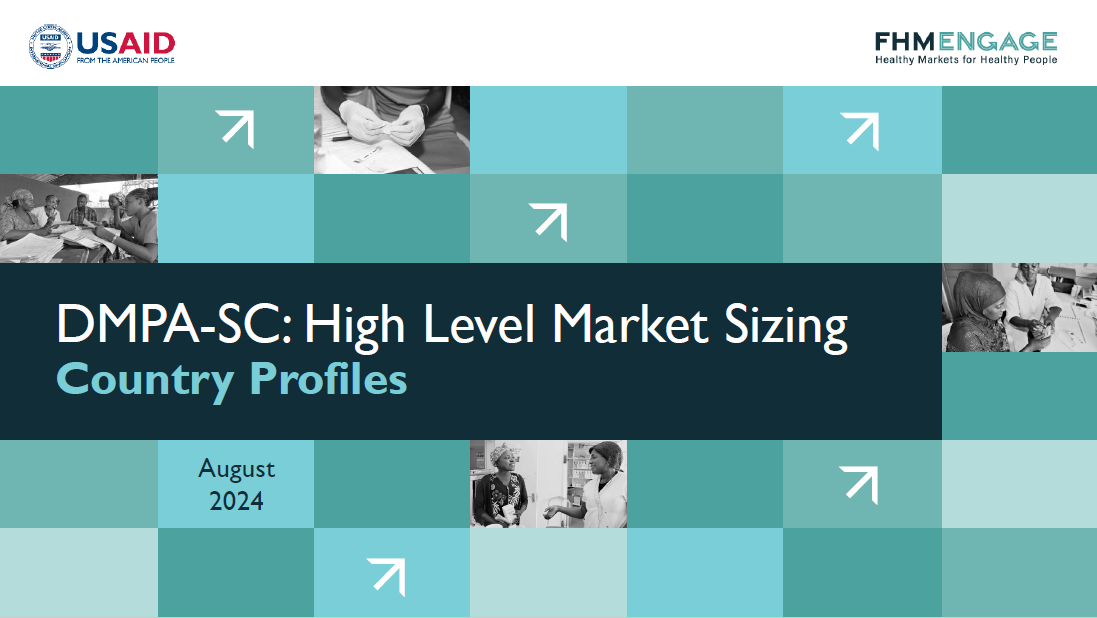
Exploring Tools for Scaling Up DMPA-SC in the Private Sector: A Guide for Family Planning Programs
Exploring Tools for Scaling Up DMPA-SC in the Private Sector: A Guide for Family Planning Programs
Scaling up DMPA-SC (subcutaneous depot medroxyprogesterone acetate), a popular contraceptive option, in the private sector requires a strategic approach. Understanding the market dynamics, demand potential, and lessons learned from past programs is crucial for success. Two key tools designed to aid in this process are the DMPA-SC High-Level Market Sizing Tool and the DMPA-SC Program Decision Tool. These tools offer vital insights and practical guidance for family planning programmers, manufacturers, distributors, and donors to support the effective expansion of DMPA-SC in new markets.
What is the DMPA-SC High-Level Market Sizing Tool?
The DMPA-SC High-Level Market Sizing Tool is a data visualization tool that provides a snapshot of the potential market for DMPA-SC in a given country or region. It utilizes specific variables from the Demographic and Health Survey (DHS) —such as population size, target demographics, and contraceptive use and need—and generates a clear, summarized view of the potential demand for the product. These estimates are intended to encourage discussions about potential opportunity, relative opportunity across countries, and about scale
This tool is particularly useful during the initial stages of program planning, as it helps decision-makers understand the scale of opportunity in the market. By visualizing key metrics, it provides a foundation for program designers to assess whether the DMPA-SC market is viable and where investments in growing the private sector for DMPA-SC might reach different groups of women.
What is the DMPA-SC Program Decision Tool?
The DMPA-SC Program Decision Tool is an Excel-based tool designed to help organizations, market actors and donor plan and scale up DMPA-SC in the private sector by applying a Market Development Framework. This framework, used by FHM Engage, helps diagnose, design, and implement interventions aimed at building sustainable markets for health products, including DMPA-SC.
Scaling up DMPA-SC in the private sector requires understanding the specific market environment you will be working in. The Program Decision Tool helps family planning programmers and other market actors think strategically about the market system and apply research and past program learning to address market challenges and incorporate this into their program planning.
In short, the DMPA-SC Program Decision Tool bridges the gap between knowledge and action, enabling market actors to plan more effectively and sustainably.
Who Needs this Information, and How Can They Use It?
Key stakeholders who would benefit from these tools include:
- Family Planning Programmers: These actors can use the tools to design and scale up programs by understanding the specific needs and opportunities in a given market, ensuring that their efforts align with the demand for DMPA-SC.
- Manufacturers: They need market size data to help inform forecasted production needs, ensuring they can meet the potential demand in a timely and cost-effective manner.
- Distributors: Having an understanding of the scale of the potential market size helps distributors plan their logistics, inventory, and distribution networks to efficiently supply DMPA-SC in target regions.
- Donors: Donors and funding agencies can use the tools to assess where investments in DMPA-SC programs can have the greatest impact, ensuring that resources are allocated to markets with the highest potential for success.
Both the Market Sizing Tool and the Program Decision Tool provide vital information that allows these actors to make informed decisions, aligning program design, manufacturing, and distribution with the needs of specific markets. By offering a structured approach to market analysis and planning, these tools are indispensable for those looking to expand the availability of DMPA-SC in a sustainable and scalable way.
Conclusion
Successfully scaling up DMPA-SC in the private sector requires careful planning, a solid understanding of the market, and the application of past learnings. The High-Level Market Sizing Tool and the DMPA-SC Program Decision Tool provide essential support in these efforts. By offering clear frameworks for diagnosis and planning, along with visual insights into market potential, these tools help ensure that DMPA-SC programs are both effective and sustainable.
For family planning programmers, manufacturers, distributors, and donors, using these tools is a crucial step toward ensuring that more people have access to this important contraceptive option.
View the webinar about these tools, held October 31, 2024.

Recent Highlights
-
Written by : Amanada Kalamar and Katie MacDonald
-
Published on : 24-Oct-24
- Highlight Type : Blog
- Country :
- Project : FHM Engage
- Language : English
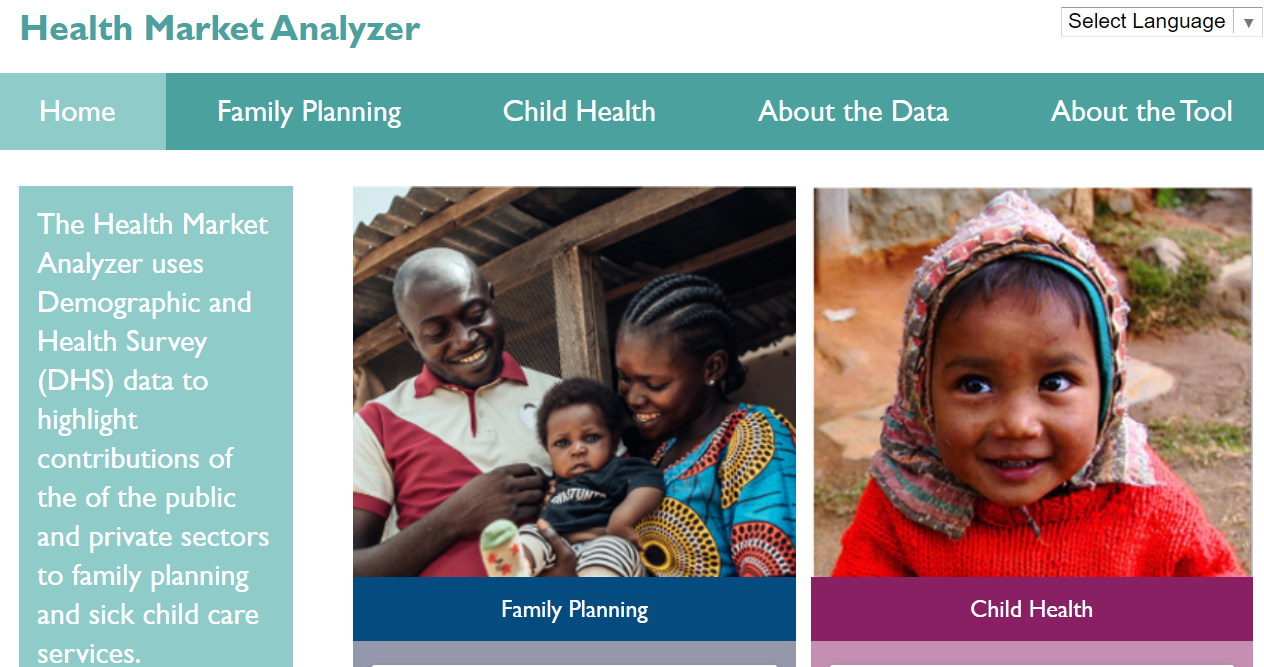
FHM Engage Launches New Tool: Health Market Analyzer
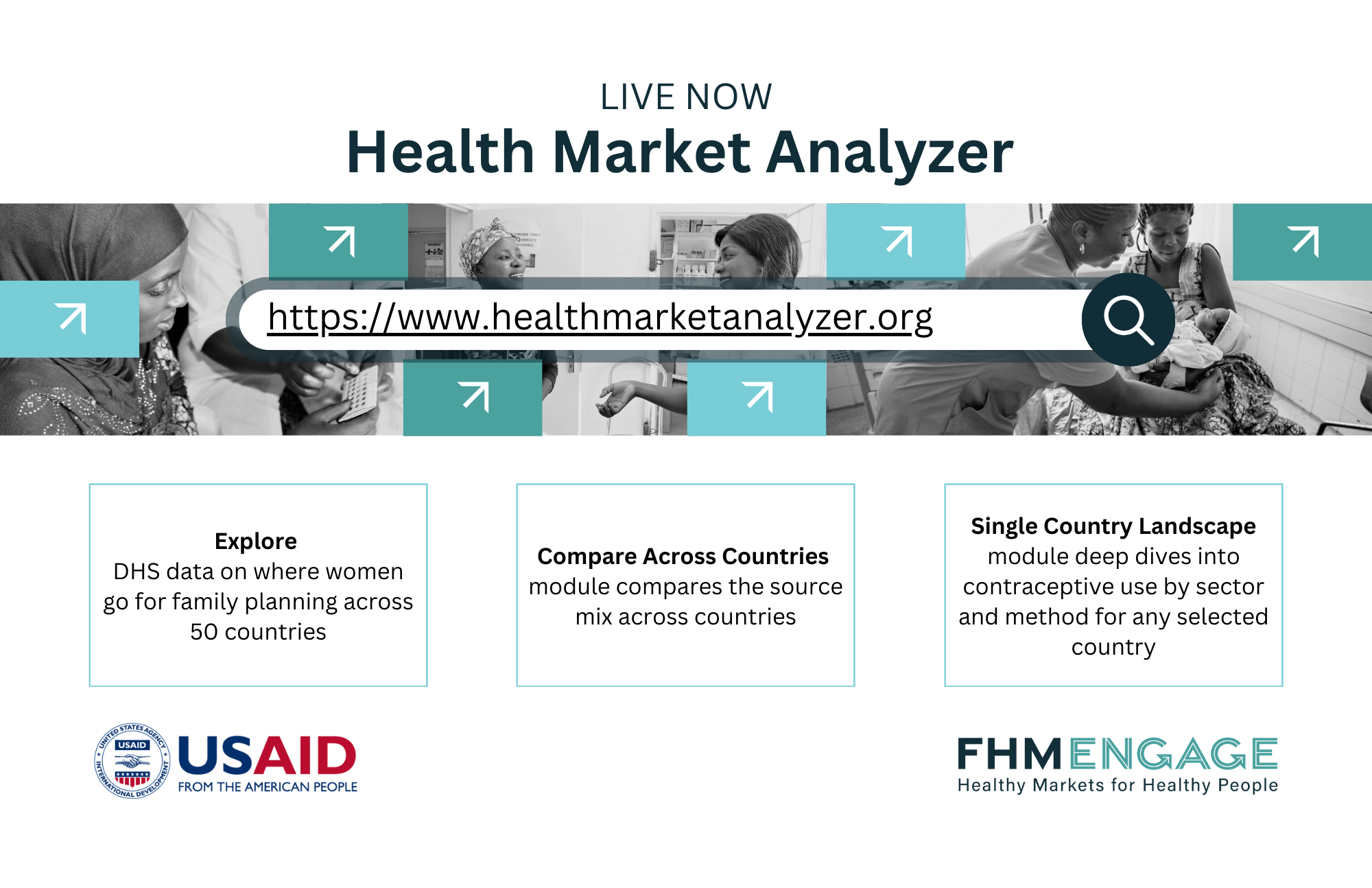
FHM Engage is excited to announce the launch of the Health Market Analyzer, a new tool that brings together two tools that were previously developed under SHOPS Plus by Avenir Health: Private Sector Counts and FP Market Analyzer.
The new tool showcases DHS data on where women go for family planning across 50 countries.
The “Compare Across Countries” module allows you to compare the source mix across countries – you can explore how the source mix varies by different demographic segments, and users of different modern family planning methods. This module also allows you to compare the method mix of users going to the public versus private sector. You can explore how method mix within each sector varies across different demographic segments.
Just interested in one country? The “Single Country Landscape” module allows you to take a deep dive into contraceptive use by sector and method for any selected country. This module provides an overview of the national picture of use by method and sector, and allows you to explore differences in sector use and non-use of family planning across demographic segments and geographic regions.
A third family planning module will be released later this year that allows you to explore future scenarios, building on the FP Market Analyzer tool. This module will let you see the implications of future changes to what methods women use, or where they go for their contraception.
Also check back soon for the launch of the Child Health section of the tool, which will include both the Compare Across Countries and Single Country Landscape modules, with a focus on source of care for sick children and childhood vaccination.
Recent Highlights
-
Written by :
-
Published on : 17-Oct-24
- Highlight Type : News
- Country :
- Project : FHM Engage
- Language : English

Webinar: Introducing New Tools for Scaling Up DMPA-SC in the Private Sector
FHM ENGAGE WEBINAR
October 31, 2024
Introducing New Tools for Scaling Up DMPA-SC in the Private Sector
Thank you for joining Frontier Health Markets (FHM) Engage to learn about new tools for DMPA-SC high level market sizing and decision-making. Speakers from FHM Engage presented the market sizing tool which was created to generate high-level market sizing estimates aimed at fostering discussions and decision-making regarding potential opportunities for the introduction and/or scale up of DMPA-SC. These estimates, accompanied by the DMPA-SC program design decision tool, can help USAID Missions and others discuss and decide whether there is potential opportunity to support DMPA introduction or scale up and resources for focusing programmatic efforts to do so.
Read our blog post on Exploring Tools for Scaling DMPA-Sc in the Private Sector: A Guide for Family Planning Programs.
View the webinar!
Questions? Please reach out to FHM Engage, fhm-engage@fhm-engage.org
Banner image: Map of countries in which FHM Engage created country profiles based on the findings from the new tools for scaling up DMPA-SC in the private sector.
Recent Highlights
-
Written by :
-
Published on : 30-Sep-24
- Highlight Type : Event
- Country :
- Project : FHM Engage
- Language : English

Resource Library
DMPA-SC: High Level Market Sizing - Country Profiles
Resource Type : Presentation
Country : Global
Year : 2024-09-30T09:03:19
Language : English
Project : FHM Engage

Supporting Private Sector Businesses in Family Planning Markets: Resources for USAID Teams and Missions
The private sector is an important source of family planning in many countries. However, many businesses face challenges that inhibit growth and their ability to provide quality healthcare. Access to capital and technical support can support small and midsize enterprises to grow and fulfill their business objectives to ultimately deliver improved outcomes for family planning users.
The following resources aim to support USAID missions in considering their options and opportunities for strengthening businesses through financial and technical assistance as part of their market development approaches for family planning.
Advancing Family Planning Outcomes Through Supporting Local Private Sector Businesses: Approach & Resources: A guide for USAID missions to explore and identify opportunities to support private contraceptive businesses to deliver family planning outcomes through a combination of financial and technical assistance.
Advancing Family Planning Outcomes Through Supporting Local Private Sector Businesses: Ghana Worked Example: An application of the approach outlined in document 1 to the market context in Ghana.
Advancing Family Planning Outcomes Through Supporting Local Private Sector Businesses: Report of Methodology, Findings & Applications: A long form report documenting the approach and research to develop documents 1 & 2.
Recent Highlights
-
Written by :
-
Published on : 23-Jul-24
- Highlight Type : News
- Country : ,
- Project : Market Access and Innovative Finance
- Language : English

FHM Engage Presents at SID-Washington 2024 Annual Conference
On Friday, April 26, 2024, FHM Engage representatives joined thousands of development practitioners from around the globe for the 2024 SID-US Annual Conference, which centered on the theme, “World in Crisis: Sparks of Hope.” In the face of tremendous challenges, including climate change, food insecurity, and growing geopolitical instability, there are windows of opportunity to advance sustainable development and strengthen resilience and security. This conference brought together speakers from around the globe to ponder and discuss opportunities for change.
FHM Engage prime implementing partner and SID-sponsor Chemonics International hosted a virtual session on “Harnessing the Power of Systems Thinking to Accelerate Local Health Markets” from 10:00 a.m. to 10:50 a.m. EST
About the session: Tackling the complex challenges of today’s healthcare landscape requires a deep understanding of the actors involved, and how they interact with one another. That’s where a systems thinking approach to health comes in! By analyzing different elements of the operating environment, from financing opportunities to laws and regulations to quality assurance standards, a systems thinking approach to market development recognizes the interrelated forces impacting sustainable access to affordable, high-quality health products and services. Join a panel of experts as they explore the innovative, practical applications of systems thinking in healthcare and the pivotal role it plays in fostering meaningful, locally led partnerships tailored to the unique needs of communities.
About the speakers: FHM Engage Project Director Dana Tilson moderated the session and speakers included FHM Engage Chief of Party/Country Director for India Dr. Amit Bhanot. Read bios and learn more about all panelists and the session on the Chemonics page here.
Session recording: View the session here.
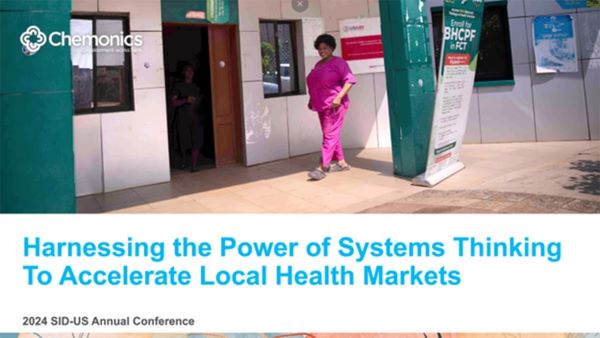
Recent Highlights
-
Written by :
-
Published on : 19-Apr-24
- Highlight Type : Event
- Country : ,
- Project : FHM Engage
- Language : English
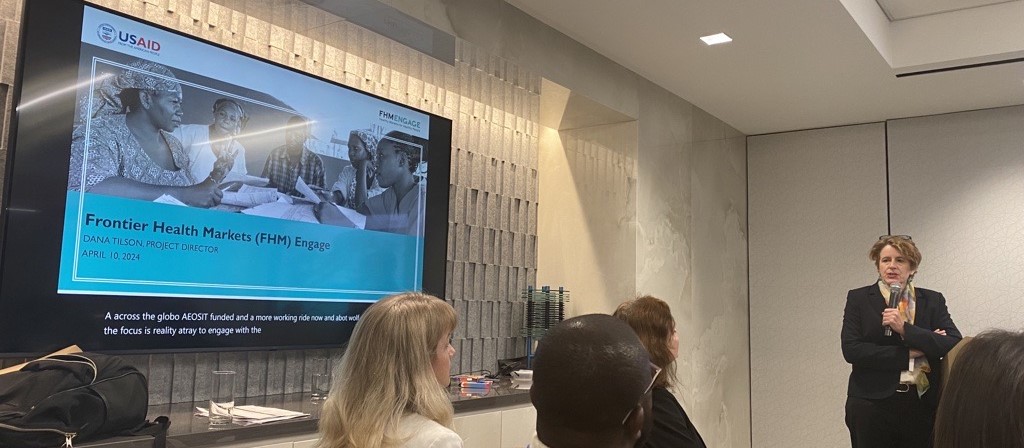
FHM Engage Presents at CORE Group Global Health Institute
Our rapidly changing and evolving world is facing challenges from disease outbreaks, climate change, and social, political, and economic impacts on women, children, and adolescents' health. Succeeding in this dynamic environment demands a multi-stakeholder approach and a deep understanding of local context and how it links to global policy. Policy and programming alignment is needed to build sustainable health systems at the national and community levels to deliver essential community health package of health services, advance equity and inclusion and achieve primary health care (PHC) for all.
On April 10, the CORE Group Global Health Institute hosted a plenary to hear from policy leaders and technical experts on shifts in policy and technical updates to meet global challenges and address the most pressing health needs. Before an audience that included CORE Group members and participants from implementers, civil society, health professional associations, youth groups, private sector, UN agencies, academia, and donor agencies, speakers emphasized the necessity of adopting an integrated approach to policy-making that underscores the interconnectedness of health challenges. They also highlighted the need for policies to be designed to foster synergy across various sectors, recognizing the interplay between disease outbreaks, climate change, conflicts, localization, and social determinants of health. Among other themes, speakers shared their unique insights on how policies can be tailored to local contexts while ensuring programmatic integrity, using scientific evidence. Speakers proposed actionable policy recommendations for advancing equity and inclusion in healthcare delivery, including strategies to dismantle systemic barriers, promote localization, and gender-responsive policies, and empower communities through participatory decision-making processes.
During a panel on “Policy and Programming in a Rapidly Changing World,” our FHM Engage Project Director Dana Tilson joined panelists from USAID, GAVI, the Global Health Council, and other relevant CORE Group members to speak about some of FHM Engage’s initiatives working with governments and local partners and involving the private sector to strengthen local health market systems and improve equal access to health products and services.
Here are notes from the FHM Engage portion of the event:
Question posed to FHM Engage Project Director Dana Tilson: USAID's Frontier Health Markets (FHM) Engage seeks to strengthen local health market systems involving the private sector and improving equal access, while working with governments and local partners. Can you speak to some of the successes with the project and how you overcame the challenges?
Response: Despite progress over the past few decades, millions of women around the world still lack access to modern contraceptive methods. This not only impacts their ability to plan their families but also affects their health and well-being. Unintended pregnancies can lead to unsafe abortions, maternal mortality, and a cycle of poverty that is difficult to break.
USAID's Frontier Health Markets Engage project seeks to strengthen local health market systems involving the private sector and improve equal access to family planning.
One of the successes of the project is its market development approach. FHM Engage recognizes that the private sector plays a crucial role in delivering healthcare services, including family planning. In many countries, more than 50 percent of family planning products and services are provided in private sector pharmacies and clinics. As such, the project has worked to strengthen the capacity of private healthcare providers and market systems and create an enabling environment for them to deliver high-quality family planning services.
Through the market development approach, we first seek to understand the private sector market for family planning or maternal and child health by looking at the core market functions of supply and demand for contraceptive products and services and identifying the root causes of why there may be supply or demand barriers. Then we look at the whole market system at the enabling environment including policy, regulations, stewardship of the market, financing constraints and market information and identify those areas that are inhibiting the private sector from delivering quality affordable products and services.
An example of the innovations coming out of this approach is the family planning marketplace that was just launched by our team in India called the Women’s Health and Livelihood Alliance. In this marketplace we have integrated health and family planning into a women’s livelihood program, where we connect investors to solution providers who are proving contraceptive information and services to young women. We intervene all the way along the value chain from contraceptive manufacturers who want to increase local domestic sales of oral contraceptive pills, to pharmacy outlets through digital aggregators, to demand generation using the latest digital interventions who make referrals to connect clinics and pharmacies. WOHLA engages with government and private sector to advocate for change in contraceptive policy and regulation to enable expansion of the private sector contraceptive market.
This approach has helped to expand access to family planning services, particularly to young women in underserved areas.
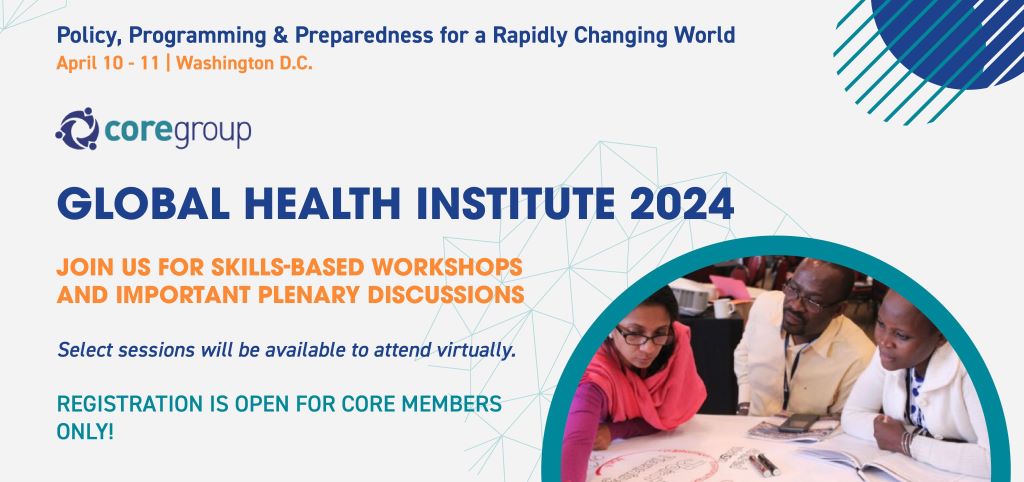
Recent Highlights
-
Written by :
-
Published on : 19-Apr-24
- Highlight Type : Event
- Country : ,
- Project : FHM Engage
- Language :
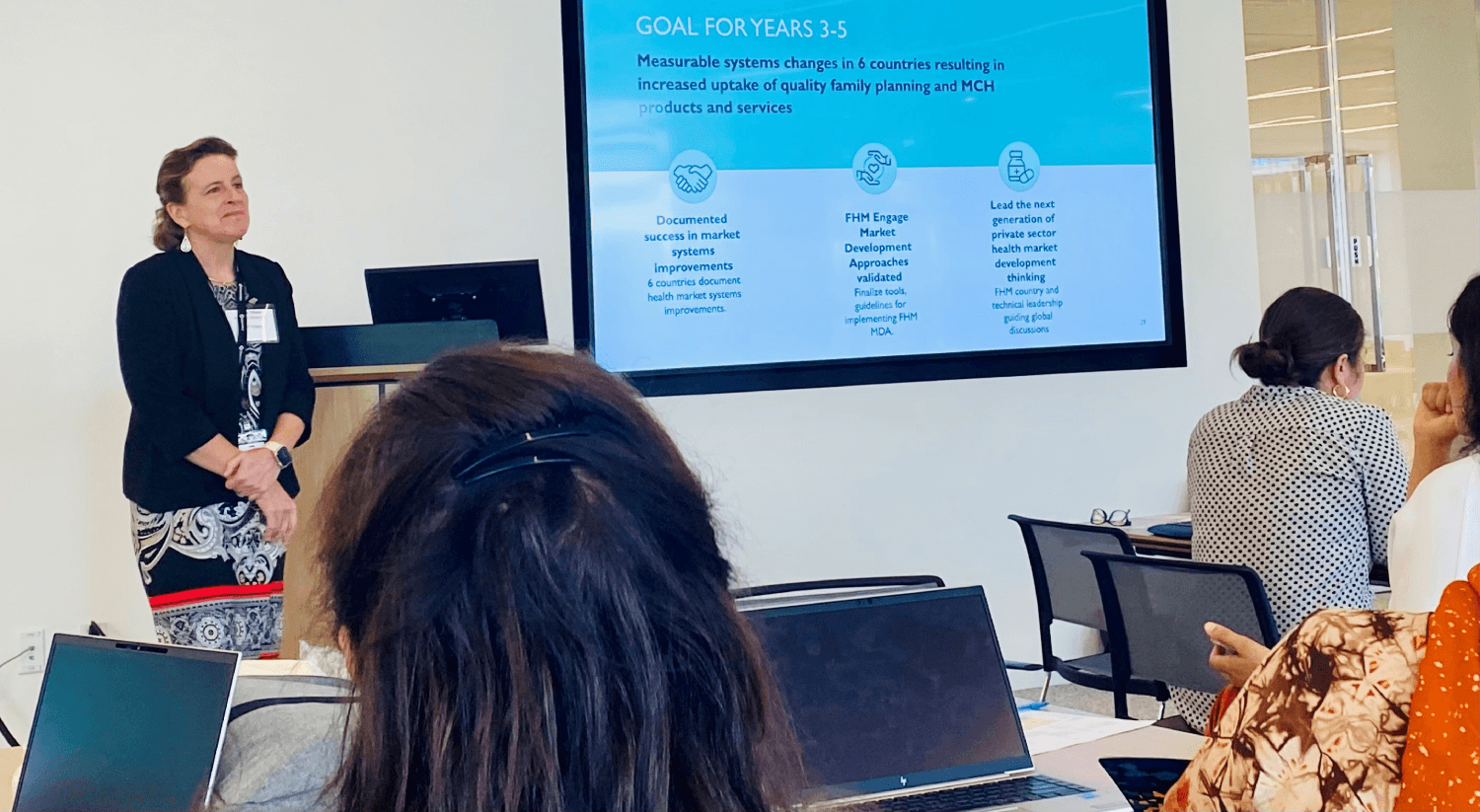
Meet FHM Engage Project Director Dana Tilson

What is your professional background and what drew you to working with private sector health markets?
I have a master’s degree in public health, and 25 years of experience implementing health projects focusing on the private sector across the globe. I have a particular passion for sexual and reproductive health, and I believe private sector health care providers and private sector distribution channels play a critical role in health care service delivery in developing markets.
The Frontier Health Markets Engage project provides an amazing opportunity for Chemonics to increase both the supply and demand for family planning and maternal and child health services and products through the private sector.
The Frontier Health Markets Engage project is designed to leverage public-private partnerships. How does engaging the private sector aid in achieving better health outcomes?
The private sector in most low- and middle-income countries supplies half of all health services and products and, therefore, is a critical player in the health sector. Facilitating better coordination, regulation, quality, and demand for private health services and products can contribute significantly to achieving universal health coverage in the most cost-effective way possible. Increasing use of the private sector can save costs to the government by providing services to people who can pay for them, and it can increase availability of health services and products overall in countries.
From your experience, what are the biggest recommendations you can give for successful collaboration between the public and private sectors? How do you think that collaboration will impact health systems in the next years?
One of the innovative approaches that FHM Engage is implementing includes developing a ‘family planning marketplace’ to connect private sector providers, manufacturers, and solution providers with sources of financing, all of which is stewarded by the private sector in collaboration with the government. FHM is also improving government stewardship of areas such as quality of health services in private sector health facilities, analysis of policy and regulatory barriers to new products and advocacy for change, and improved use of data for planning and incentivizing the private sector to introduce new products and expand their services.
There is currently a big focus on localization among the development community. When engaging the private sector, how does FHM Engage ensure that local priorities are integrated and that relevant local actors have a seat at the table?
FHM Engage conducts an initial market assessment in a country that includes local stakeholder interviews to ensure that the priorities of the local actors in the market are included. After completing the market assessment, we conduct a stakeholder co-creation workshop to analyze the findings in the assessment and jointly develop the market intervention strategies together with the local private sector stakeholders. The local actors and local priorities are always at the center of the work that we do.
You have had an interesting career in global development. What got you interested in joining Chemonics and, more specifically, the FHM Engage program?
Chemonics is an influential and highly regarded organization in global health development, so it was a big draw for me to work for Chemonics. FHM Engage is USAID’s flagship private sector health market development project and has a fascinating cutting-edge mandate to develop private sector health markets across the globe. This project offers me the opportunity to apply the learnings and experience I have had over the last 25 years to make a difference in the lives of so many women and girls by bringing products and services to them that they would otherwise not have access to. For me, that is fulfilling.
This story was cross-posted from Chemonics International where the interview was originally entitled “Development Works Here with Dana Tilson”. Read Dana Tilson’s bio on the Chemonics International site here.
Recent Highlights
-
Written by :
-
Published on : 16-Nov-23
- Highlight Type : Blog
- Country :
- Project : FHM Engage
- Language : English
Pagination
- Page 1
- Next page





